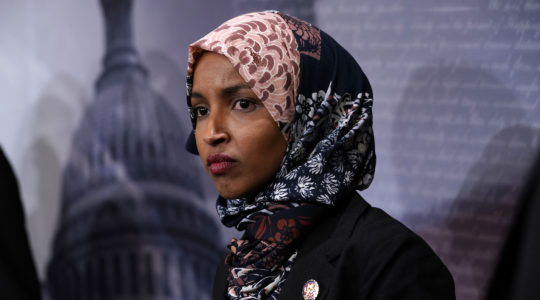“Civil Rights” — the very words conjure up Jewish communal involvement, broad and deep. But that was not always the case, as JTA coverage shows.
Over the years, the JTA had more than 2,200 articles tracking every step of the civil rights struggle, especially Jewish involvement in the movement. One can find stories from as early as the 1920s and 1930s about Jews fighting for racial equality, including one report on a rabbi who sought to head off opposition to two black doctors moving into an exclusive neighborhood in White Plains, N.Y., and another article on a rabbi in Montgomery, Ala., who lost his job because he fought on behalf of the Scottsboro Nine.
Into the late 1940s, however, there was no consensus within the organized Jewish community as to whether the national Jewish groups or local Jewish community relations councils should be active on the issue of advancing civil rights for black Americans. Among the few voices heard from the very beginning was the American Jewish Congress — always an activist organization — which made common cause early on with the National Association for the Advancement of Colored People.
Jewish involvement in civil rights was not a “given.” Indeed, there was a vigorous debate during the late 1940s and early 1950s about the wisdom of “relations with Negroes.” The community was divided on this matter, not only geographically — North and South — but in terms of questions of ideologies, strategies and tactics as well. At bottom, was civil rights a “Jewish” issue?
This question had resonance for American Jews, given the urgency with which the community viewed the issue of anti-Semitism and its corollary, discrimination against Jews. But these were often seen specifically as issues of Jewish security and Jewish well-being. From the late 1940s, however, and continuing to the mid-1960s, the larger cause of civil rights was absolutely regnant on the American Jewish communal agenda.
Why were Jews, across the board, involved in civil rights? It was not because the American Jewish community was a liberal community — as it was; it was not because civil rights was “the right thing to do” — as it was. American Jews were involved in civil rights, in fact, out of narrow Jewish self-interest. Indeed, it was Stephen S. Wise, the great American Jewish leader — and one of the founders of the NAACP — who made the case repeatedly over the years that civil rights was not only a Jewish issue, but that it was the quintessential Jewish issue. Solve the discrimination problems of blacks, argued Wise, and you solve those problems for Jews, and for other groups in society.
Wise’s rationale carried the day in the Jewish community, and in due course the civil rights struggle became a movement, generated, organized and staffed by the Jewish and black communities, together with a third important actor, the trade union movement.
JTA coverage of the nascent, hence vigorous, movement reflected these developments. More so than coverage in the general press, the JTA’s coverage accurately reflected the reality of a coalition fighting for civil rights.
The rationale for Jewish involvement in civil rights had another dimension to it, a strategic dimension, which comes through clearly in JTA’s reporting during the 1960s. Social scientists had long known that changing the racist attitudes of individual bigots was fruitless, and would not result in the societal changes that were called for. Early on, therefore, the decision was made that civil rights activity would be focused on changing the central institutions of society — employment, educational, political, social.
A consensus developed around the advocating of legislative and judicial initiatives — the courts and the legislatures, including the U.S. Congress — in order to achieve the goals of equality in these arenas. The great victories in the courts, beginning with the landmark Brown v. Board of Education, resulted from this strategic decision; more important were the three monumental legislative victories — the Civil Rights Act of 1964, the Voting Rights Act of 1965, the Fair Housing Act of 1968 — which were nothing less than revolutionary.
As reported in the JTA — and again missed in the mainstream press — the Jewish community played a key advocacy role, both in the communities and on Capitol Hill, in the passage of these acts.
Finally, Jewish groups were instrumental in the organizing of the Leadership Council on Civil Rights, which became the central coordinating arm for the movement. The LCCR, staffed out of the offices of the National Community Relations Advisory Council the national umbrella body for Jewish public affairs), brought together black and Jewish organizations on the national level. The activities of the LCCR were reported in the JTA.
Jerome A. Chanes is editor of the “The Future of American Judaism” (Trinity/Columbia University Press).
Other Articles of Interest:
1949 American Jewish Congress, Negro Organization Issue Joint Survey on Civil Rights
1953 Supreme Court Urged to Keep Ban on Racial Restrictive Covenants
1955 Negro Jewish Leaders Support Israel Bonds at Harlem Church Rally
1956 Rabbinical Students Protest Arrest of Negroes in Alabama Dispute
1962 Jewish Groups Urge Investigation of Destruction of Negro Church
1962 Anti-Jewish Attitudes Found Among Negro College Students
1963 Negro Anti-Semitism Deplored; Jewish Efforts for Negro Equality Cited
1963 Twenty Conservative Rabbis Fly to Birmingham to Back Negro Demands
1963 San Francisco Jews Back Full Righs for Negroes; Aid Food Campaign
1963 ADL Backs Civil Rights Bill; Stresses Legitimate Negro Grievance
1963 Jews & Christians, White & Negro Seen United in Civil Rights March
1964 Jewish Organizations Lauded by Negro Leader at NAACP Parley
1964 Rev. Martin Luther King Lauds Role of Jews in Fight for Negro Rights
1965 Negro Marchers from Selma Wear Yarmulkes in Deference to Rabbis
1965 High US Official Says Anti-Semitism Noted Among Negro Businessmen
1966 Negro-Jewish Relations Discussed at Convention of Jewish Congress
1966 Negro Leader Appeals to Jews to Back Negro Cause Despite Anti-Semitism
1967 Prominent Negroes Condemn Negro Anti-Semitism; Quit the ‘Liberator’
1967 Negro Daily Tells Black Power Advocates That Jews Battle for Negro Rights
1968 NCRAC Parley Opens With Appeal to Jews to Remain Active in Negro Rights Struggle





